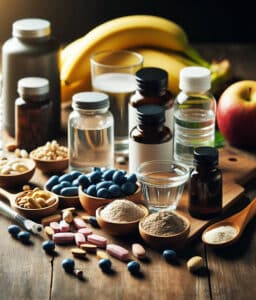Post-holiday diet
Various post-holiday diets are recommended, which supposedly will help you lose weight and lose extra pounds that appeared after the holidays, such as grapefruit, kefir, egg, orange, buckwheat diets, fasting days, and so on. You don't need all this.
So what exactly happened? In a short time, you have eaten a lot more calories than your body needs. All the extra calories are automatically converted into fat and deposited on the stomach and thighs...? No, that's not quite true. Calorie intake should be considered in a broader period of time than one or two days - I would recommend it - in weekly intervals.
That is, if you need, for example, 1700 Kcal/day (11900 Kcal per week) for the normal functioning of the body, and even if you once "sinned" with various delicacies and alcohol, say, 2400 Kcal, but in the next few days you will take about 1500 - 1600 kcal, and then you will return to 1700 Kcal/day, taking the same 11900 Kcal per week, as usual - extra kilograms will not appear.
During the holidays, along with extra calories, too many carbohydrates (fruits, sweets, lemonades, flour products, alcohol) and salt (chips) are usually consumed, which retain water in our body. 1 g of carbohydrates holds 3-4 g of water, but 1 g of excess salt - about 100 g of water. Both salt and carbohydrates are necessary for our body - we cannot exist without them, but if there are too many of them, we become heavier due to excessively delayed water.
100g of cereals contain an average of 75-80g of carbohydrates, 100g of cakes and cookies 60-70g of carbohydrates, 100g of chips - about 50g of carbohydrates plus a lot of salt, which also retains water. Without knowing these facts and pursuing the fastest possible result, many mistakes are made. For example - by choosing a fruit diet or buckwheat diet (cereals) You will not get rid of excess carbohydrates (more precisely, water retention), but will directly increase their amount in your body and also the amount of water retained.
How to normalize your weight after the holidays
First of all - calm down, nothing terrible has happened. The weight gained is not fat.
Second - after the event, think about how many calories you need to consume in the next 3-5 days so that it matches your usual calorie intake on a weekly basis.
Third - reduce carbohydrates in your diet and, if you have eaten salty foods, also products that contain salt. Choose vegetables and protein-rich products (beef, chicken, turkey, cottage cheese, eggs…).
Fourth - drink water, at least 2 liters a day. This sounds paradoxical, but excess fluid can only be removed from the body with water, which dissolves the excess minerals and removes them from the body in the urine. The recommendation - to drink more water - is not to fool the stomach, but to dissolve the salt deposits and remove them from the body (for example, to remove 1 g of excess salt, you need to take about 100 ml of water.).
That's all. As you can see, everything is simple and no miraculous means are needed -😊.
In addition to reading:
Share this article
Follow me on Facebook
I recommend reading these articles as well

Multivitamins - do we need them?
Do multivitamins really help improve health, or are they just a waste of money?

Keto diet
Is the ketogenic diet or Keto the long-awaited way to lose weight effortlessly, and improve athletic performance, well-being and overall health?

How to create the perfect body
Each of us can create an ideal body. The "shapes" of our stature are the result of our ambition, our determination and our willpower.

Deep muscles - what is it and why should it be trained?
Deep muscles are not visible - however, they are important for maintaining health and especially back health.

